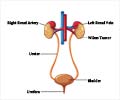Depressive symptoms could be a predictor of survival for patients with metastatic renal cell carcinoma.

"Our findings, and those of others, suggest that mental health and social well-being can affect biological processes, which influence cancer-related outcomes," said Lorenzo Cohen, Ph.D., professor in MD Anderson's Departments of General Oncology and Behavioral Science and director of the Integrative Medicine Program. "They also suggest that screening for mental health should be part of standard care because there are well accepted ways of helping people manage distress, even in the face of a life threatening illness.
"We were particularly interested in examining psychosocial factors as predictors of survival," Cohen continued. "Our findings indicate that we're now able to understand some of the possible biological pathways that explain the association between depression and survival."
Cohen, the lead author, and his colleagues examined 217 MD Anderson patients with newly diagnosed metastatic renal cell carcinoma from April 2000 – November 2005. At study entry, patients completed a number of questionnaires and provided blood samples.
The surveys measured depressive symptoms, general quality of life, social support, coping, religiosity and spirituality. Participants also provided five saliva samples per day for three days to evaluate fluctuations of cortisol, the stress hormone that should be high in the morning and drop throughout the course of the day. Increased cortisol levels have been found in patients with depressive symptoms and are linked to cellular alterations, Cohen said.
At the time of analysis, 64 percent of patients were deceased and for those who died, the average time from diagnosis to death was 1.8 years. Overall, 23 percent of patients reported depressive symptoms within a clinical range (scores of 16 or higher) and this was associated with shorter survival time, even after controlling for disease-related risk factors. Similarly, a flattened cortisol slope from morning to evening was related to shorter survival time.
Signaling Pathways Unlock Clues
To determine whether the increased mortality risk associated with elevated depressive symptoms might stem from pro-inflammatory gene expression, whole-genome profiling was conducted on tissue samples from 15 patients with the highest depressive symptoms and 15 risk-matched patients with the lowest depressive symptom scores.
"We know specific signaling pathways like NF-ĸB play a critical role in regulating inflammation within cells," said Anil Sood, M.D., professor in MD Anderson's Department of Gynecologic Oncology and a co-author on the study. "Our goal was to determine if these pathways were expressed at greater levels in patients with depressive symptoms and we found data indicating they were."
In total, 116 genetic transcripts were found to be upregulated by an average of 50 percent or more in patients with high depressive symptoms, according to the study. The data suggest the association between patient psychological condition and survival time may stem from a dysregulation in inflammatory biology and cortisol slope.
Future Studies Are Needed
The authors note a number of limitations to the study, including the difficulty to determine causality between psychological stress and cancer survival in human models, as inducing stress would be unethical. It's also possible there are other factors that could influence depressive symptoms and survival that were not addressed in the study. Additionally, whether high levels of stress were present before a patient's diagnosis will require additional attention, said Cohen.
The next step is to conduct clinical trials to evaluate whether the management of depression using behavioral techniques or pharmacologic interventions can influence survival in patients with mild, moderate or severe mood disorders and a cancer diagnosis, Cohen said.
Source-Eurekalert















